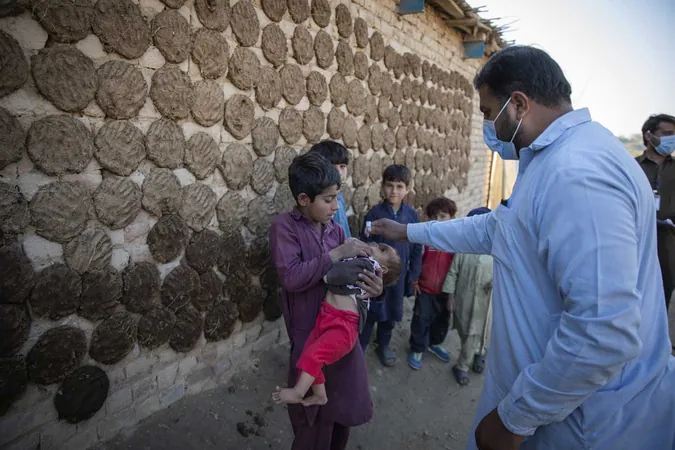
Remembering Our Heroes: Health Care Workers Lost in 2024's Conflicts
2024-12-23
Author: Sarah
As 2024 draws to a close, the painful reality of violence against health care workers has become starkly evident. Under international humanitarian law, all parties involved in conflicts are mandated to protect medical professionals, their facilities, and the vital supplies they depend on. Tragically, this year has brought devastating losses to the health care community around the world.
We honor the brave health workers who perished while striving to save lives. Each death represents not just the loss of an individual but the erasure of countless years of support and care they could have provided to their communities. For families and friends who knew these heroes beyond their professional roles—as children, partners, and friends—we extend our heartfelt condolences. It is crucial that we not only remember their sacrifices but also actively support those who continue their life-saving legacies.
Gaza: A Critical Situation
On December 4, the International Federation of Red Cross and Red Crescent Societies (IFRC) announced the tragic death of Alaa Al-Derawi, a paramedic with the Palestine Red Crescent Society. He was fatally shot while returning from delivering patients. The IFRC reaffirmed the imperative of respecting healthcare workers and facilities, stating, "Any attack on healthcare workers, ambulances, and medical facilities is unacceptable."
Statistics further underline the severity of the crisis in Gaza: as of early December, over 1,057 health care workers have lost their lives since October 2023. The United Nations Office for the Coordination of Humanitarian Affairs reported a harrowing pattern of detentions and abuse affecting health care professionals, with more than 250 alleged detentions occurring amid a backdrop of escalating violence. The World Health Organization (WHO) has also documented 591 attacks on health facilities within this tumultuous period.
Pakistan: Targeted Health Workers
In Pakistan, attacks targeting health workers—especially those involved in vaccination campaigns—have continued unabated. Reports indicate that at least 17 health workers were killed in 2024, with particularly brutal attacks occurring in late October and early November, where eight individuals, including five children, lost their lives during polio vaccination efforts. President Asif Zardari condemned these attacks, labeling the perpetrators as “enemies of the future of the country.”
Sudan: A Health Care Crisis
Sudan’s health system is in shambles, exacerbated by ongoing conflict. The WHO reported 88 attacks on healthcare facilities since April 2023, a tragic number that increased to 108 by September. According to the United Nations Office of the High Commissioner for Human Rights, these attacks represent severe violations of international humanitarian law, impeding access to health care amidst dire shortages of medical services caused by a prolonged war.
In December, the UN released a report detailing the impacts of violence on vital health infrastructure, including facilities that serve essential surgical and reproductive health needs.
Ukraine: The Price of Conflict
Ukraine’s health care system has also borne the brunt of conflict. Since the initiation of the Russian invasion in February 2022, over 100 health care workers have been killed, with nearly 1,900 health facilities and numerous pharmacies either damaged or destroyed. The World Health Organization recorded a staggering 1,940 attacks on health care services, marking it as the highest number ever recorded in a humanitarian crisis globally.
In Conclusion: A Call to Action
The tragic losses of health care workers in 2024 serve as a sobering reminder of the essential role they play in our society and the grave risks they face, particularly in conflict zones. It is vital to advocate for the protection of health care professionals and to support humanitarian efforts aimed at safeguarding those who seek to heal others amidst chaos. The memories of our fallen heroes must not only inspire reflection but also ignite a collective commitment to ensure their sacrifices pave the way for a safer future for health care workers worldwide.

 Brasil (PT)
Brasil (PT)
 Canada (EN)
Canada (EN)
 Chile (ES)
Chile (ES)
 España (ES)
España (ES)
 France (FR)
France (FR)
 Hong Kong (EN)
Hong Kong (EN)
 Italia (IT)
Italia (IT)
 日本 (JA)
日本 (JA)
 Magyarország (HU)
Magyarország (HU)
 Norge (NO)
Norge (NO)
 Polska (PL)
Polska (PL)
 Schweiz (DE)
Schweiz (DE)
 Singapore (EN)
Singapore (EN)
 Sverige (SV)
Sverige (SV)
 Suomi (FI)
Suomi (FI)
 Türkiye (TR)
Türkiye (TR)